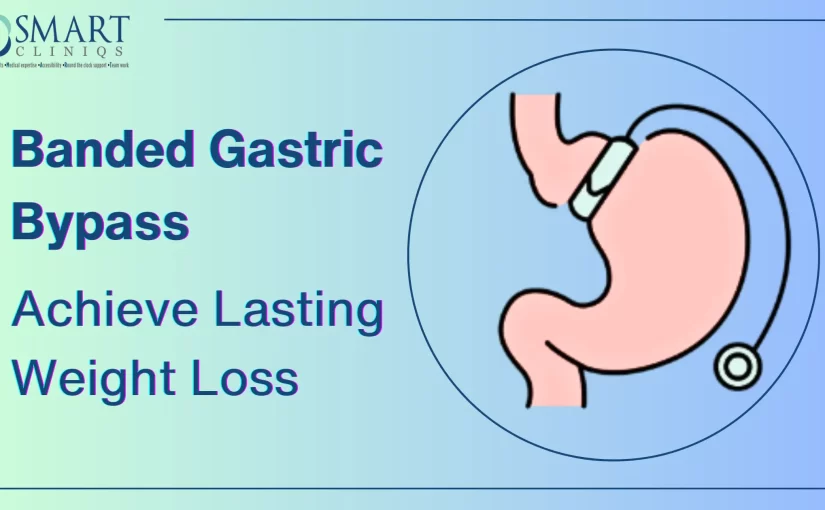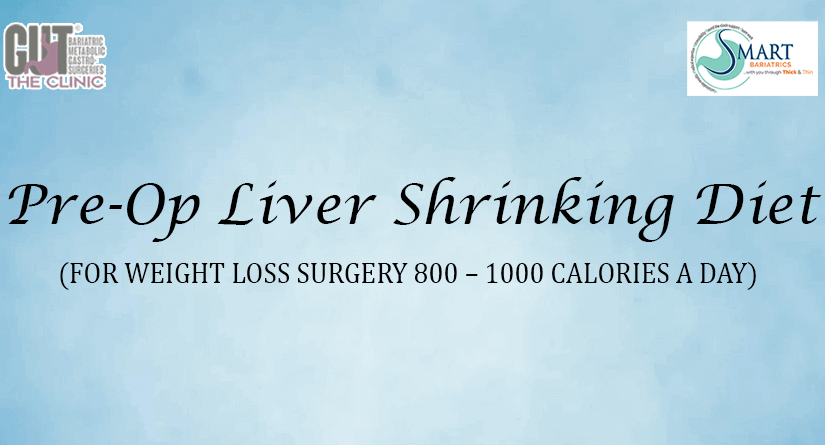Is losing weight becoming a struggle for you?
At times, following a healthy lifestyle, diet and exercise alone isn’t helpful in losing those extra kilos putting you at risk of developing obesity-related complications like diabetes and hypertension. In such a scenario, Bariatric surgery is a suitable and established alternative to lose weight.
One such surgical intervention is Banded gastric bypass. Like other bariatric surgeries, it can help patients achieve significant and sustained weight reduction, thereby enhancing their overall well-being.
Understanding Banded Gastric Bypass
Banded bypass surgery is a modification of the Roux-en-Y Gastric Bypass (RYGB) that enhances its restrictive component. In the bariatric procedure, a band encircles the upper portion of the stomach pouch, created during the RYGB surgery.
This band, in conjunction with the bypass, aims to
- Calibrate and standardize the size of the pouch and the stoma (the opening between the stomach pouch and the small intestine).
- Reinforce the sizes to improve the restrictive effect of the surgery.
The rationale for adding a band is to further restrict the size of the stomach pouch and the stoma which helps in slowing the passage of food and preventing overeating. This modification is intended to sustain weight loss for a long-term.
It’s a minimally invasive procedure performed under general anaesthesia.
How Banded Gastric Bypass Presents a Unique Approach?
Banded gastric bypass offers numerous benefits. Patients often experience:
- Long-term maintenance of weight loss
- Reduced risk of obesity-related co-morbidities, such as Hypertension (High Blood Pressure), Type 2 Diabetes Mellitus, and Sleep Apnea
- This minimally invasive surgery restricts food intake and, helps to achieve significant weight loss
With its advantages, Banded Gastric Bypass surgery proves to be an effective option for combating obesity and its associated health issues.
Who Should Consider Banded Gastric Bypass?
Banded Bariatric Procedure can be considered an appropriate alternative for:
- BMI above 32.5 kg/m2 with obesity-related co-morbidities
- BMI above 37.5 kg/m2 without co-morbidities
- BMI > 30 kg/m2 with life-threatening obesity-related disorders like uncontrolled diabetes, cardiovascular disease/cardiomyopathy and severe obstructive sleep apnea
- Patients motivated to lose weight and committed to long-term follow-up
- Patient should have attempted conservative methods of weight loss and failed in the past
- Bariatric Surgery to be considered only between the ages of 18 – 65 years
- Bariatric surgery may be considered in patients more than 65 years in the presence of severe obesity-related co-morbidities/disability
- Bariatric Surgery may be considered in patients < 18 years in special situations after paediatrician endocrinology paediatrician/endocrinology certification, or after attainment of puberty or completion of skeletal maturity
Banded Gastric Bypass is proven to be an effective approach to reducing BMI and maintaining a healthy weight.
Success Stories: Real-life Transformation
Dr. Vivek Gupta, a senior orthopaedic and joint replacement surgeon, has openly shared his successful journey with gastric bypass surgery. Struggling with obesity since childhood, his weight peaked at around 130 kilograms, accompanied by alarmingly high cholesterol levels. His blood pressure soared to dangerous levels of 210 over 140. Despite rigorous exercise and strict dietary regimens, he was unable to shed the excess weight.
Dr. Gupta underwent gastric bypass surgery and achieved a remarkable weight loss of 89 kilograms in a relatively short period. Now he enjoys a higher quality of life and has experienced a significant boost in self-confidence.
Embracing a Healthier Future
Banded Gastric Bypass is a promising option for those battling obesity. This minimally invasive procedure offers significant weight loss and tackles obesity-related health concerns.
While Banded Gastric Bypass offers a compelling choice, it is necessary to consult an accredited surgeon about the type of bariatric surgery suitable for you, based on your anatomic needs. Bariatric surgery can effectively help you reach your weight-loss goals and maintain long-term results when combined with careful adherence to your surgeon’s post-operative care plan.
References:
- Gastric Band Surgery (Lap-Band® Surgery) > Fact Sheets > Yale Medicine
- Banded Gastric Band Surgery (circlehealthgroup.co.uk)
- Banded Gastric Bypass – Bariatric Solutions: Bariatric Surgery (bariatric-solutions.com)
- Gastric Bypass Surgery | Healthier Weight
- Obesity & Metabolic Surgery Society of India – OSSI (theossi.com)
- https://www.verywellhealth.com/gastric-banding-2509704
- https://www.thedigestive.in/weight-loss-treatments/bariatric-surgery/gastric-band
- https://www.medicalnewstoday.com/articles/298313#risks
- https://www.hopkinsmedicine.org/health/treatment-tests-and-therapies/gastric-restrictive-surgery







